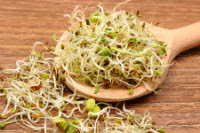
On your next foray down the produce aisle, don’t overlook the wonderful sunchoke, aka Jerusalem Artichoke. These tubers look nothing like an artichoke and are easily mistaken for a strange potato! A native North American plant, sunchokes are a member of the sunflower family.
Low in calories and nutrient dense, sunchokes provide iron, potassium, thiamin (one of the B vitamins) and a good amount of fiber in a one-cup serving. The carbohydrate contained in sunchokes is inulin, which doesn’t cause spikes in blood sugar, so it’s a great option for anyone concerned about diabetes or weight management. Sunchokes also contain vitamins, A, C, and E. The most unique nutrient found in sunchokes is known as prebiotics, a type of non-digestible carbohydrate found in many root vegetables. Food-based prebiotics enhance nutrient absorption and help maintain a healthy intestinal tract by promoting growth of “good” gut bacteria, which supports immunity.
Sunchokes have a nutty, mildly sweet flavor and are delightful to eat raw – shredded or sliced into a salad or sliced and served with raw carrots and other veggies. They can be cooked in a variety of ways and added to stir-fry dishes in lieu of water chestnuts. Their flavor is enhanced when lightly seasoned for sauteing or roasting. You can also puree sunchokes for soups.
Available year-round in the U.S., prime harvest time is October through early spring. Buy tubers that are firm, free of sprouts or bruises, with a smooth, clean surface making them easier to prepare.
References
Contact our office for more information
Journey of Health Medical Clinic
619-772-1164

 How are your cells doing today? Don’t know? Then a Nutrient Assessment might be in order.
How are your cells doing today? Don’t know? Then a Nutrient Assessment might be in order.



